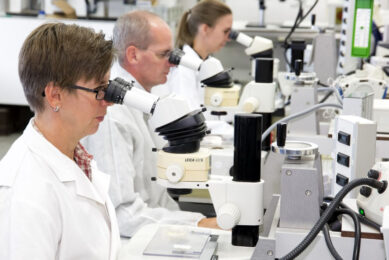USDA helps train scientists to diagnose AI
The USDA’s Animal and Plant Health Inspection Service Administrator Ron DeHaven announced that 24 scientists from 19 countries will be trained on diagnostic testing for highly pathogenic Avian Influenza (HPAI).
The workshop is underway this week at the USDA’s National Veterinary Services Laboratories (NVSL) in Ames, Iowa. It is the third in a series of train-the-trainers workshops on HPAI testing and diagnostics.
“This is just one example of how we are working to prevent or slow the spread of high pathogencity avian influenza,”said DeHaven. “The goal is to assist senior-level veterinarians and poultry disease experts from countries that either have discovered HPAI, or are at high risk for the disease. When they return to their countries, they are better equipped to train their colleagues in lab procedures and protocols.”
The 24 participants come from countries that have requested USDA technical assistance in HPAI testing and diagnostics. Countries participating include Argentina, Brazil, Burkina Faso, Burma, Cote d’Ivoire, Democratic Republic of Congo, Dominican Republic, Indonesia, Lebanon, Libya, Mexico, Mozambique, Oman, Pakistan, Romania, Sudan, Taiwan, Uganda, and Uruguay.
Similar to the previous workshops, training will include hands-on lab exercises and lectures from USDA experts. The first, held from Feb. 27-March 3, had 25 participants from Algeria, Armenia, Bangladesh, Bulgaria, Georgia, Indonesia, Korea, Malaysia, Morocco, Philippines, Romania, Senegal, Sri Lanka and Vietnam. The second, held from May 15-19, had 26 participants from Bangladesh, Cambodia, Cameroon, China, Ghana, India, Iraq, Kenya, Kuwait, Laos, Malaysia, Mongolia, Nepal, Nigeria, Philippines, Serbia-Montenegro, Singapore and Sri Lanka.
The workshops are a joint effort of Iowa State University and the USDA’s Agricultural Research Service, Animal and Plant Health Inspection Service and the Foreign Agricultural Service.













